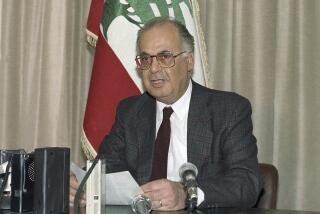Lebanon’s Premier Karami Quits : Usually Optimistic Leader Steps Aside as Troubles Persist
- Share via
NICOSIA, Cyprus — The increasing burden of Lebanon’s political and economic misery led Monday to the resignation of Rashid Karami, the country’s once perennially optimistic premier.
Karami, a 66-year-old Sunni Muslim from the northern Lebanese city of Tripoli, told reporters in Beirut that he is resigning his post “in the interest of the nation.”
Karami has been premier since he accepted a mandate from President Amin Gemayel in April, 1984, to form a government of “national unity,” half Christian politicians and half Muslim, to seek a solution to the factional fighting that has racked the country since the 1975-76 Lebanese civil war.
In fact, the absence of any organized government in Lebanon has become an embarrassing fact of everyday life, and Karami’s 10-man Cabinet has been unable to meet regularly since January, 1986, when a Syrian-backed peace plan was rejected by Gemayel and other Christian leaders.
Ever the Optimist
But since his appointment, Karami has waxed optimistic at even the gloomiest of times, offering his resignation only when efforts aimed at achieving a compromise ended in a stalemate. By law, the resignation is not legal until it is accepted by the president.
Karami is a member of the Sunni faction of Islam, which under the Lebanese constitution is the sole qualification for the job of premier. Unlike the militarily strong Shia Muslims and the Christians, Karami’s fellow Sunnis have long had no organized militia group, so his political power base is a tiny one.
Karami’s was one of the key voices that appealed for Syrian intervention in West Beirut, where 7,000 Syrian soldiers were deployed in January to end months of militia anarchy. As a result of the Syrian move, much of the decision-making on Lebanon’s behalf is now done by the political mandarins in Damascus.
Karami has served several times as premier. He was appointed for the first time in 1955, then again in 1958 and was named to the post five more times through the 1960s. When full-scale civil war between Muslims and Christians erupted in 1975, Christian President Suleiman Franjieh turned to Karami as a premier who might calm Muslim hostility. He remained in the job until he was replaced late the following year.
A Lebanese Cabinet session held two weeks ago, the first in seven months, ended in recriminations from both Muslim and Christian ministers, illustrating once again the illusory quality of Lebanon’s government.
Treasury Bankrupt
Although the Lebanese treasury continues to produce new money, it is bankrupt; the army is divided along religious lines, and Parliament is slowly shrinking as members die of old age and are not replaced.
At one point, the economic crunch appeared to be a possible unifying factor, with the government announcing a series of measures to deal with the crisis after a paralyzing strike by the 250,000-member General Confederation of Labor.
In the last three years, the Lebanese pound has fallen from a level of five to the U.S. dollar to the present 120 to the dollar, sending the costs of imports, including food, soaring to unimagined heights.
Christian leaders have increasingly criticized Karami’s stewardship and suggested that he resign.
Referring to the growing chorus of criticism Monday, Karami said, “We find there can be no reconciliation between East and West. . . .” This was a reference to the two main sectors of the capital, the Christian East and the Muslim West.
Even a former supporter such as Walid Jumblatt, leader of the Druze community, has attacked Karami recently for approving government payments to Christian army units, because the Christians are in confrontation with the Druze at certain points.
More to Read
Sign up for Essential California
The most important California stories and recommendations in your inbox every morning.
You may occasionally receive promotional content from the Los Angeles Times.










